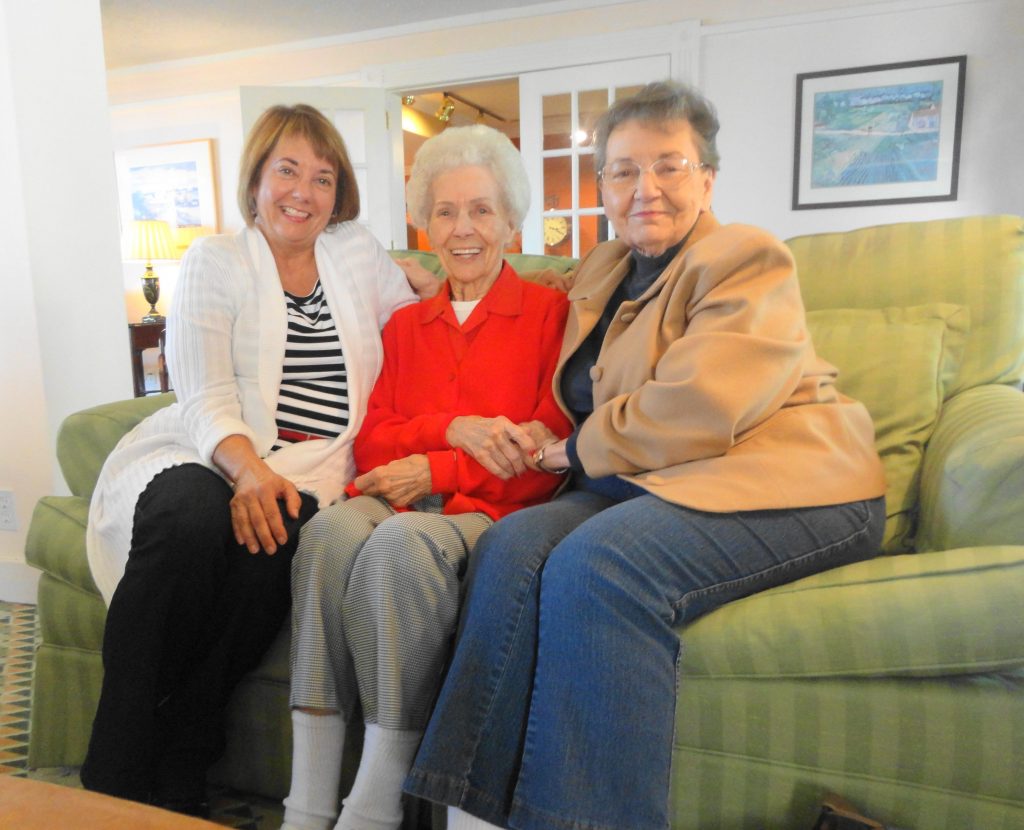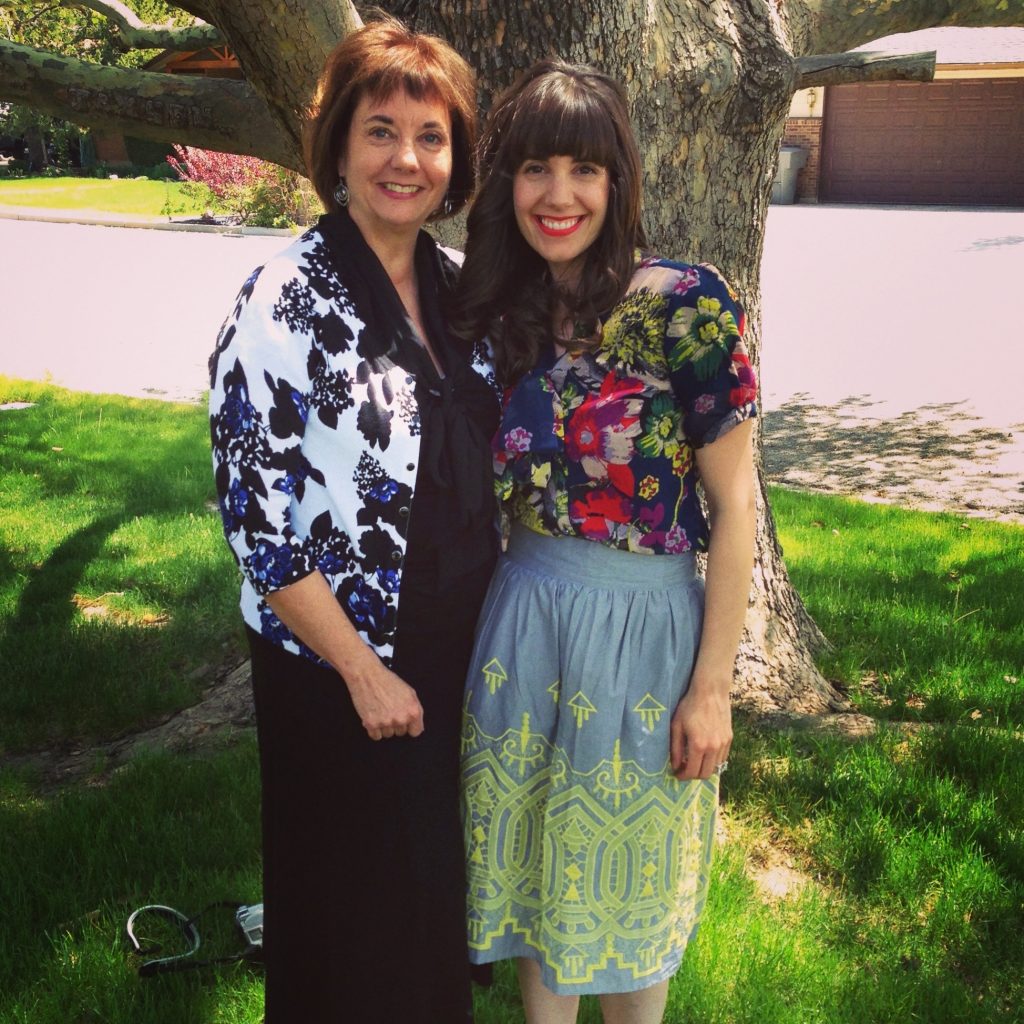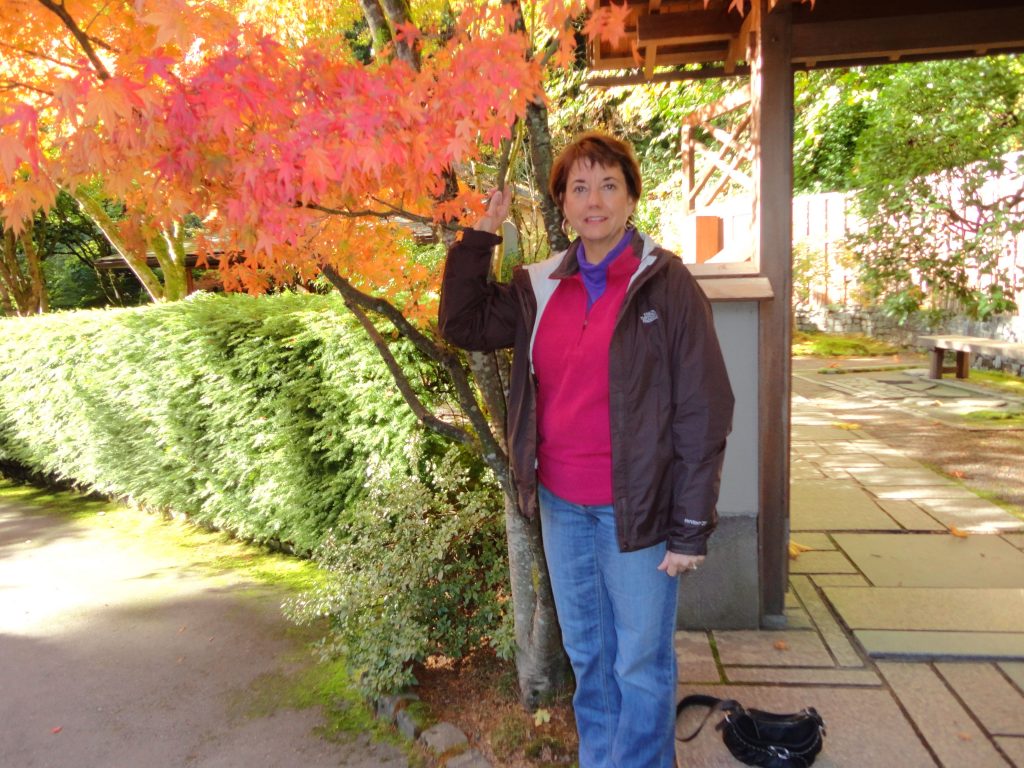The following interview with Pam Shorr was first published by the Mormon Women Project in August 2013.
When Pam Shorr decided to stop attending church, she doubted she would ever go back. She recalls thinking, “I really want to find who I am and what I believe. I just want to do my own thing for a while.” But eventually, Pam found herself prompted to return, and an inspired Relief Society president showed her the way. She describes her reactivation in the Church as difficult, terrifying, and inspiring. “When I returned,” she says, “I was ready for the whole thing, and I have never looked back.” Pam is interviewed here by her daughter, Krisanne.
Can you tell me about your experience growing up in the Church?
I grew up in Salem, Oregon, in a family that was partly active in the Church. My parents didn’t keep the Word of Wisdom, and I don’t think either of them liked to go to church but they felt like it was the right thing for their three children. They would go off and on together, but mostly off. Toward the middle years of my life my mom took us to church because my dad told her to, but she didn’t like to go. I didn’t really like going because the girls my age in the ward weren’t very nice to me. Many of the parents in the ward got together socially and my parents usually didn’t go to their parties. Inevitably, the kids of those parents were together a lot and they knew each other. They ignored me because my parents weren’t active in the ward or in the social scene. That was my impression.
I went to church because I had to, but I never liked it. In high school, I realized I had a choice. I could just refuse to go, and there wasn’t much my parents could do about it. I just said, “Forget it. I’m not going.” During my senior year, a couple of girls moved into our ward, Jo and Janelle. They were ostracized by the other girls in the ward like I was. We banded together, and they became good friends of mine in high school. Jo was the Laurel president, and she always invited me to Young Women’s, and I also really liked the Laurel leader at the time. Her name was Ann Papworth. She made an effort to connect with me. She was fantastic. After Jo and Janelle moved in, I would go to church off and on, but I still didn’t like it much.
Was there ever a point when you developed a testimony of the gospel?
After I graduated from high school, Jo and I thought it would be kind of cool to go to Ricks College together. Ricks College [now BYU–Idaho] was where I really gained my testimony. It was a hard transition, though, because Idaho was very different from Oregon. I remember I brought my 8-track tapes–Emerson Lake & Palmer, Pink Floyd, Led Zeppelin, and Jethro Tull. I listened to Joni Mitchell a lot, too. My roommates thought my Dark Side of the Moon album was devil music. They listened to Barbara Streisand, John Denver, the Carpenters, Seals and Croft. Eventually, I did find some like-minded kids, and of course my friend Jo was along for the ride.
During those college years, I felt really good about the Church. Jo and I took some time off from school and went back east to New York to spend a year as mother’s helpers. I lived with a Jewish family and nannied their kids. There was a large group of LDS kids in New York, and we had a lot of fun together. All of my friends were LDS kids, and that was good for me. There were also some investigators our age, so I had some missionary opportunities as well.
When I got back from New York, I started dating your dad, and we were both really excited about the gospel. He told me how he had read the Book of Mormon in a weekend and had this profound manifestation that it was true. We dated for about nine months and then got married in the Salt Lake Temple on December 1, 1977. We were married for about two and a half years. Our marriage was really hard even though we were both active members. In hindsight, it’s hard for every newly married person. It’s difficult to make that adjustment from attending a student ward to being married to attending a regular family ward. I didn’t have very good examples of healthy marriages growing up, either. I really struggled with it. I struggled with having to work and then being pregnant and then having a baby and trying to teach Primary and hold a baby in one hand. It got too hard. There were other problems too. Your dad and I decided to separate, but we remain friends to this day. You were a year old when I moved back home to Salem, Oregon.
What happened with your involvement with the Church after your divorce?
I attended church for a while. I went back to the ward in Salem that I had grown up in, which I wasn’t really happy about because of the painful memories I had there. I was going through a hard time. I was living alone with you and really tried to make it on my own. I got a part-time teaching job and then decided I wanted to get my master’s degree in Special Education. I had a calling in the Nursery, and I remember sitting in the Nursery and thinking about all of the things I didn’t like about the Church and that most of those things revolved around service. I liked reading the scriptures, I liked going to the meetings, but I didn’t like callings or visiting teaching or anything service. Service is what makes you grow, but I didn’t like it at the time because I was extremely busy. I was alone and raising a daughter and getting a master’s degree and working and trying to keep my finances going. Church service was just one more thing to worry about. Additionally, there wasn’t a lot of support for divorced women in the Church that I could see. Even my visiting teachers were nervous to come visit me. They didn’t know what to say to me. Through all of this, I remember thinking, “I really want to find who I am and what I believe. I just want to do my own thing for a while.”
I moved up to Portland and decided that I wasn’t going to attend church once I got there. I wanted to see what it was like out in the world. Honestly, I think it was a good thing for me to get away for a little bit. On the one hand, it’s too bad that I didn’t stay active in the Church. On the other hand, I really needed to make a clean break so that I could figure things out. I doubted if I would ever go back because the majority of my time growing up in the Church was painful. I could count on one hand all of the really good years I had in the Church–mostly during my Ricks College and BYU years.
You eventually remarried a man who was Jewish. How did that inform your Mormonism?
When I moved up to Portland, I knew I wanted to remarry but I wasn’t going to marry a Mormon guy. However, I was very particular and knew that that if I did remarry, the person had to like kids, be a good man, come from a nice family, and be respectful.
I met Jack at a teaching conference, and I thought he was a really nice guy. I noticed how fun he was with you and how gentle he was. He liked animals and kids, and I could tell that he came from a good family. I also really liked the fact that he was Jewish. I had always had Jewish friends growing up and was really curious about their faith and traditions. In high school, two of my closest friends were Jewish. When I was in college, I loved reading the Old Testament. I had some friends who went to Israel on semester abroad, and we would make Middle Eastern dinners together when they returned. When I nannied for the Jewish family in New York I would join in their Friday night Sabbath activities. Every time I thought about the religion, I got warm feelings. In fact, my grandfather’s best friend growing up in Brigham City [Utah] was Jewish–the only Jewish person in Brigham City. He owned the store where my grandfather worked. My dad was named after my grandpa’s Jewish friend, Ben Sherman.
When I married Jack, I had been less-active in the Church for six years, and I had these feelings that maybe I would return to the Church. I thought that if I ever did return, I would have to be there for the right reasons, though. I knew Jack was a wonderful, supportive guy, and I said to him before we got married, “There is a small chance that I might go back to the Mormon Church. Are you okay with that?” He said, “If that makes you happy, I’m okay with that.” With that said, I never expected Jack to join the Church if I started going back. Even though Jack wasn’t active in his religion, I understood that his Jewish heritage was very important to him. I didn’t and still don’t believe that I should expect him to change that part of him. It would be like saying, “Who you are is not right or not good enough.” I didn’t think that was respectful. Likewise, he wasn’t expecting me to become Jewish, either.
Did you return to the Church, then?
After we got married, I felt very settled and my life was very happy. We moved to Beaverton, Oregon, and I got a great teaching job and you started first grade. When you were about nine years old, you said to me one day, “Mom, a lot of my friends go to church. Why don’t we go to church?” I was pregnant with your brother Matthew at the time, and I started getting these strong feelings about going back to church, too. My brother Eric was on his mission at this point. My mom and dad were inactive. I was inactive. You weren’t baptized. Eric told us that he had been praying and fasting for us constantly on his mission. It was his desire that we would all return to the gospel.
I knew if I decided to go back to the Church, it was going to be hard. I was a little worried about Jack’s reaction. I had received his blessing right before we got married, but he really didn’t know a whole lot about Mormons because I had never been active during our courtship and early marriage, and he didn’t know what a commitment to Mormonism requires. Also, I didn’t know where the Mormon Church was in Beaverton. I looked up the address but I couldn’t figure out where it was located. I wasn’t even sure which ward I was in. I didn’t know any Mormons. I thought, “The only way to resolve this is to pray about it.” While I was saying the prayer, I thought to myself, “All right, this is it. No turning back now. This is going to happen because prayers are answered.”
The next week I got a newsletter from the Beaverton 1st Ward. I thought, “A newsletter? Wow! That is a quick answer to a prayer!” The following week I got a phone call from the Relief Society president of our ward, Ann. She said, “I just had a feeling I needed to call you. You’re on the no-contact list, and if you really prefer no contact, please let me know.” I told her that I wanted to talk, so she came to my house, and I told her that I was having these strong feelings that I should go back to church. Ann said, “I just couldn’t get your name out of my head. Every time I looked at the names on the no-contact list, your name just glowed. I had to call you.” I said, “You were inspired. I would like to work my way back into the Church, but I’m terrified.”
It took me about a year to get the courage to actually attend the ward. Once I went back, I was so excited. I loved conference. I remember calling my mom and dad and saying, “You guys will not believe this, but I’m going back to church.” And they said, “You’re not going to believe this, but we are too.” They bought me a new set of scriptures and the book, Jesus the Christ. There was just such a wonderful spirit in my life at this time. We eventually had the missionaries over to teach you the discussions because you were ten years old. You were ready to get baptized. You were such a sweet girl and were ready to go to church and be a part of the ward.
It’s funny, when my brother Eric came home from his mission, I said, “Guess what, Eric? We’re all going to church now.” He wasn’t surprised.
How has your life changed since returning to the Church?
Returning to the Church has blessed our family. There is a peace in our home. I always have the neighborhood book group at our house, and the members of the group say that there is always such a neat spirit here. I think that it has blessed Jack and blessed our marriage. Maybe it’s blessed him to be patient with me. I’m learning things every day about that. The gospel has blessed my children and my ability to communicate with them. It’s definitely blessed me as a person. I always felt like I was “kicking against the pricks” when I was active before. When I was reactivated, I had to work through some of my issues. I had to get rid of my hard heart. It was difficult.
My faith has grown during this process. Having faith is important, especially regarding service. If you’re extended a calling, you need the faith to say, “Yes, I can do that. It’s going to be really hard, but I can do that.” Or if you get a list of people to visit teach who are difficult you need the faith to say, “Yes, I can do this,” even if what you’re being asked is a little scary or uncomfortable.
I learned that service is really the key to everything, and I like it now! I like every aspect of the Church. I like callings, visiting teaching, having visiting teachers–all of the things that I didn’t like before. When I returned, I was ready for the whole thing, and I have never looked back. It hasn’t all been easy. There have been some hard times, but I haven’t lost the faith. I always made the commitment that if things start to slide because of my crazy schedule of working full time as an elementary school teacher, and raising three kids, I will always attend my meetings and fulfill my callings. I know it’s best to go with a good attitude and a willingness to learn, but sometimes you just have to show up even if you’re not feeling like it.
Sometimes I wonder where I would be if I had never left the Church. But then I remember that recent talk by Elder Holland where he tells us that where we are right now is enough. It’s enough. Where I am is a good thing. Most of the people I visit teach are inactive. I tell them, “If I can come back to church, you can come back. It’s possible. And it will bless your life when you’re ready.” I go by myself, and I have always encouraged them to call me if they need a ride or if they need someone to go with them.
Even though I’ve attended church by myself pretty much my entire life, I have rarely felt alone. I feel like I am fulfilling an important calling. I am more aware of people who sit alone or people who are new or people who look unhappy, because I’ve been there, and I will sit next to them and introduce myself. I don’t go to church now and think, “Oh, I’m sitting alone,” because it’s not all about me. Now I think, “What can I do to help others?” I’ve just grown. It’s about time.



